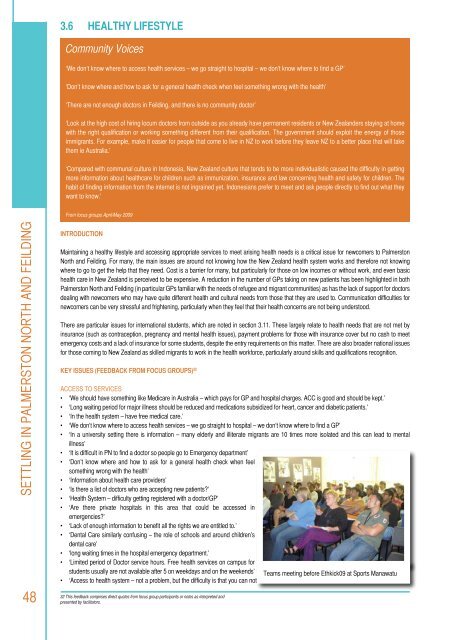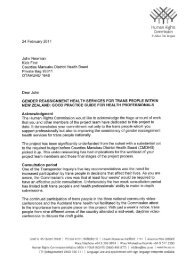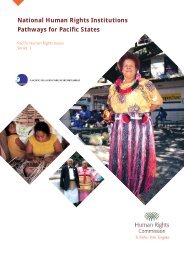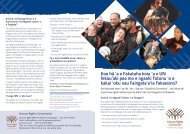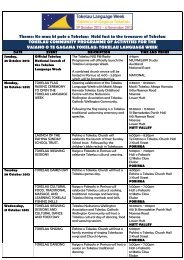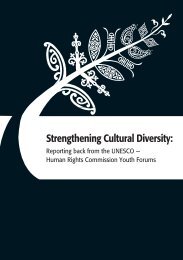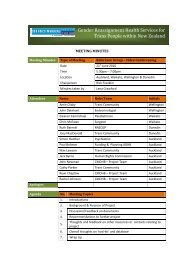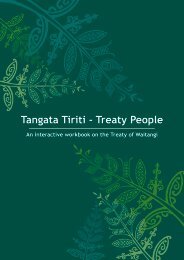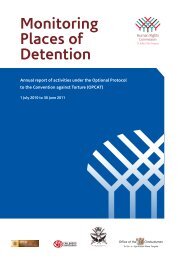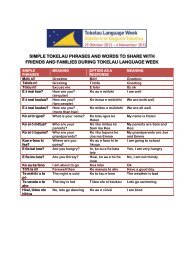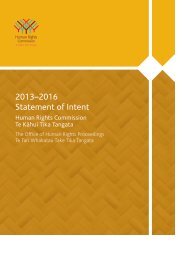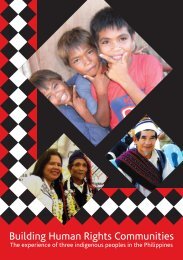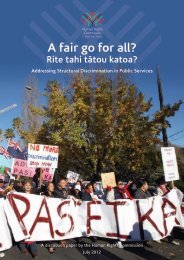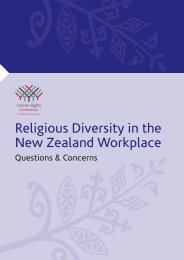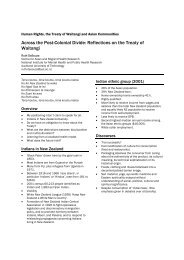Settling In Palmerston North and Feilding - Human Rights Commission
Settling In Palmerston North and Feilding - Human Rights Commission
Settling In Palmerston North and Feilding - Human Rights Commission
Create successful ePaper yourself
Turn your PDF publications into a flip-book with our unique Google optimized e-Paper software.
3.6 HEALTHY LIFESTYLECommunity Voices‘We don’t know where to access health services – we go straight to hospital – we don’t know where to find a GP’‘Don’t know where <strong>and</strong> how to ask for a general health check when feel something wrong with the health’‘There are not enough doctors in <strong>Feilding</strong>, <strong>and</strong> there is no community doctor’‘Look at the high cost of hiring locum doctors from outside as you already have permanent residents or New Zeal<strong>and</strong>ers staying at homewith the right qualification or working something different from their qualification. The government should exploit the energy of thoseimmigrants. For example, make it easier for people that come to live in NZ to work before they leave NZ to a better place that will takethem ie Australia.’‘Compared with communal culture in <strong>In</strong>donesia, New Zeal<strong>and</strong> culture that tends to be more individualistic caused the difficulty in gettingmore information about healthcare for children such as immunization, insurance <strong>and</strong> law concerning health <strong>and</strong> safety for children. Thehabit of finding information from the internet is not ingrained yet. <strong>In</strong>donesians prefer to meet <strong>and</strong> ask people directly to find out what theywant to know.’From focus groups April/May 2009SETTLING IN PALMERSTON NORTH AND FEILDING48<strong>In</strong>troductionMaintaining a healthy lifestyle <strong>and</strong> accessing appropriate services to meet arising health needs is a critical issue for newcomers to <strong>Palmerston</strong><strong>North</strong> <strong>and</strong> <strong>Feilding</strong>. For many, the main issues are around not knowing how the New Zeal<strong>and</strong> health system works <strong>and</strong> therefore not knowingwhere to go to get the help that they need. Cost is a barrier for many, but particularly for those on low incomes or without work, <strong>and</strong> even basichealth care in New Zeal<strong>and</strong> is perceived to be expensive. A reduction in the number of GPs taking on new patients has been highlighted in both<strong>Palmerston</strong> <strong>North</strong> <strong>and</strong> <strong>Feilding</strong> (in particular GPs familiar with the needs of refugee <strong>and</strong> migrant communities) as has the lack of support for doctorsdealing with newcomers who may have quite different health <strong>and</strong> cultural needs from those that they are used to. Communication difficulties fornewcomers can be very stressful <strong>and</strong> frightening, particularly when they feel that their health concerns are not being understood.There are particular issues for international students, which are noted in section 3.11. These largely relate to health needs that are not met byinsurance (such as contraception, pregnancy <strong>and</strong> mental health issues), payment problems for those with insurance cover but no cash to meetemergency costs <strong>and</strong> a lack of insurance for some students, despite the entry requirements on this matter. There are also broader national issuesfor those coming to New Zeal<strong>and</strong> as skilled migrants to work in the health workforce, particularly around skills <strong>and</strong> qualifications recognition.Key Issues (feedback from focus groups) 32Access to Services• ‘We should have something like Medicare in Australia – which pays for GP <strong>and</strong> hospital charges. ACC is good <strong>and</strong> should be kept.’• ‘Long waiting period for major illness should be reduced <strong>and</strong> medications subsidized for heart, cancer <strong>and</strong> diabetic patients.’• ‘<strong>In</strong> the health system – have free medical care.’• ‘We don’t know where to access health services – we go straight to hospital – we don’t know where to find a GP’• ‘<strong>In</strong> a university setting there is information – many elderly <strong>and</strong> illiterate migrants are 10 times more isolated <strong>and</strong> this can lead to mentalillness’• ‘It is difficult in PN to find a doctor so people go to Emergency department’• ‘Don’t know where <strong>and</strong> how to ask for a general health check when feelsomething wrong with the health’• ‘<strong>In</strong>formation about health care providers’• ‘Is there a list of doctors who are accepting new patients?’• ‘Health System – difficulty getting registered with a doctor/GP’• ‘Are there private hospitals in this area that could be accessed inemergencies?’• ‘Lack of enough information to benefit all the rights we are entitled to.’• ‘Dental Care similarly confusing – the role of schools <strong>and</strong> around children’sdental care’• ‘long waiting times in the hospital emergency department.’• ‘Limited period of Doctor service hours. Free health services on campus forstudents usually are not available after 5 on weekdays <strong>and</strong> on the weekends’ Teams meeting before Ethkick09 at Sports Manawatu• ‘Access to health system – not a problem, but the difficulty is that you can not32 This feedback comprises direct quotes from focus group participants or notes as interpreted <strong>and</strong>presented by facilitators.


